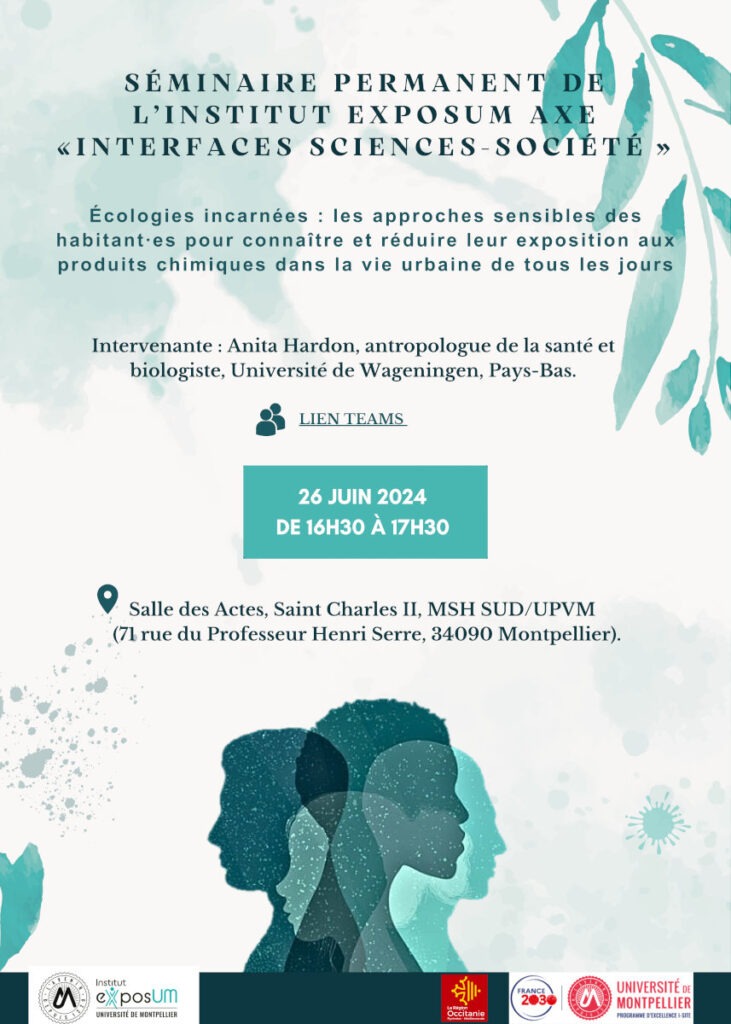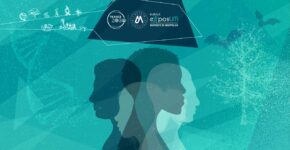Écologies incarnées : Les approches sensibles des habitant·es pour connaître et réduire leur exposition aux produits chimiques dans la vie urbaine de tous les jours
Cet évènement est passé !
Le séminaire présente le projet transdisciplinaire “Embodied Ecologies”, basé sur la science citoyenne, qui permet aux personnes affectées par la pollution chimique de collecter des données pour les scientifiques et de définir les priorités de recherche. Ce projet vise à étudier les toxicités cumulatives en combinant l’ethnographie et la cartographie sensorielle, et à promouvoir des pratiques pour réduire les dommages causés par ces produits chimiques.
L’intervenante Anita Hardon présentera des idées clés sur la manière dont les gens ressentent, comprennent et agissent pour réduire leur exposition aux produits chimiques dangereux dans les environnements urbains aux Philippines, en France et aux Pays-Bas. Elle discutera également des défis de la mesure des expositions et proposera des solutions pour rendre les résultats utilisables.
L’intervenante Dr. Anita Hardon est biologiste médicale et anthropologue, et a mené des études transdisciplinaires sur les produits chimiques et pharmaceutiques, générant des connaissances ethnographiques importantes.

Embodied ecologies: Residents’ sensitive approaches to knowing and reducing their exposure to chemicals in everyday urban life
Chemicals enter and pass through our bodies via multiple pathways: the air we breathe, the water we drink, the work we do, the soil on which we live, play and grow our food, the food we eat, the building materials in our homes and the (personal) hygiene products we use, often without knowing what chemicals they contain. These toxic chemicals interact with each other, with organic matter in our environment and with our body’s own endogenous molecules. They are metabolized by our organs and excreted by our bodies in the form of chemical metabolites, which find their way into our waterways and affect the quality of our drinking water.
This presentation will introduce the transdisciplinary “Embodied Ecologies” project, based on citizen science, where people affected by chemical pollution not only gather data for scientists but also help define research priorities. This project aims to investigate the cumulative toxicities that can be experienced by combining ethnography and sensory mapping. It also aims to promote practices for reducing the harm to people associated with these chemicals.
Anita Hardon will evoke key insights into how people feel, know and act to reduce their exposures to potentially hazardous chemicals in urban environments in the Philippines, France and the Netherlands. She will go on to reflect on the challenges of measuring exposures using different techniques and suggest ways of making the results usable.
Speaker: Dr. Anita Hardon was trained as a medical biologist and anthropologist and has been engaged in transdisciplinary studies on synthetic chemicals, and pharmaceuticals. Her research has generated important ethnographic insights into the use of these technologies in diverse social-cultural settings, and their effects in everyday life. Anita Hardon is currently chair of the Knowledge, Technology, and Innovation group of Wageningen University and Research, and Professor of Anthropology of Care and Health at the University of Amsterdam. She has published widely disseminated articles, special issues, and books (Chemical Youth (an open access book), 2021 Palgrave Macmillan; Social Lives of Medicines, 2002 Cambridge University Press).
Recevoir un récapitulatif de l’agenda de l’UM chaque semaine
* En renseignant votre mail vous acceptez de recevoir chaque semaine le récapitulatif de l’agenda de l’UM par courrier électronique et vous prenez connaissance de notre politique de confidentialité. Vous pouvez vous désinscrire à tout moment à l’aide du lien de désinscription ou en nous contactant par mail.
